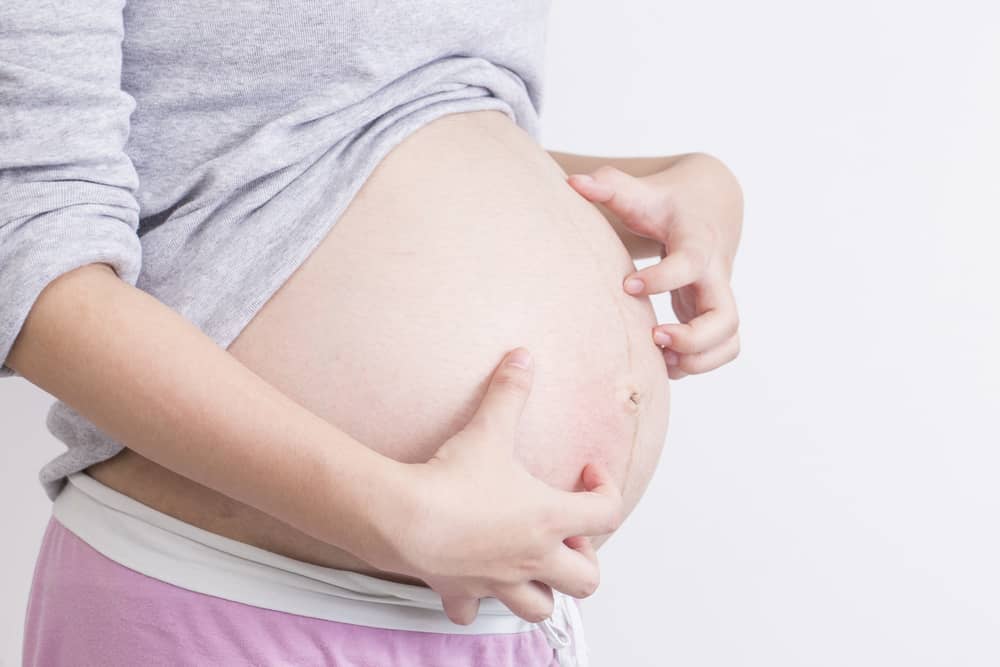
Table of Contents
Most pregnant women experience severe itching (the main symptom) in their late pregnancy and the common cause behind this is cholestasis, which is a common liver disease or liver disorder that is experienced only in pregnancy. In other words, the Intrahepatic Cholestasis of Pregnancy (ICP) is a condition where the normal flow of bile acid is affected by an increase in the pregnancy hormones.
The symptoms of cholestasis occur in the third trimester of pregnancy, that is when hormones are at their peak and also fade away within a few days post giving birth.
- Cholestasis outside the liver is known as extrahepatic cholestasis.
- Cholestasis inside the liver is known as intrahepatic cholestasis or obstetric cholestasis.
As noticed by the Cincinnati Children’s Hospital Medical Center, intrahepatic cholestasis of pregnancy affects about 1 out of 1,000 pregnant women and is more common in Chilean and Swedish ethnic groups.
But, what causes cholestasis of pregnancy ICP? What are the signs and symptoms of cholestasis? Can it be treated?
If you have these questions in mind, continue reading this article curated by Parenthood bliss to get all your answers, also feel free to contact us regarding any questions.
What Causes Intrahepatic Cholestasis of Pregnancy ICP?
None other than the pregnancy hormones causes cholestasis. It affects the bile acid levels of the liver in pregnant women and results in liver disease as it slows or stops the flow of bile.
- The gallbladder tends to hold the bile that is responsible to break down fats in digestion, produced by the liver.
- This causes a build-up of the bile acids in the liver and is capable of spilling into the bloodstream, which as per pregnant women tends to get worse at night.
As far as diagnosing an ICP is concerned, it is done when the total bile acid (TBA) or the serum bile acid is measured at about 10 micromol/L and above.
Studies have shown that the cause of the increase in bile acids is the pregnancy hormone called estrogen alone. But, recent research suggests that progesterone contributes just as much as its backup.
Symptoms of Obstetric Cholestasis
As per the health information, the symptoms of obstetric cholestasis may include:
- Severe itching, particularly on the palms of the hands and feet
- Yellow dark urine
- Pain in the right upper quadrant (RUQ) with no gallstones
- Bowel movements that are pale or light in color
- Fatigue or exhaustion
- Loss of appetite
- Depression
- Whites of the eyes
- Fetal distress
- Jaundice or yellowing of the skin to the soles of the feet and mucous membranes
- Nausea
What are The Risks Caused by The Decrease of Bile Acids in ICP?
As per the studies, about 1 to 2 pregnancies amongst a total of 1,000 pregnant women experience the risk of developing cholestasis due to the decreased bile flow in their last weeks of pregnancy.
Here are the women who have a higher risk of getting intrahepatic cholestasis of pregnancy or ICP:
- Women carrying multiples
- Those who had faced liver damage in the past
- The women with mothers or sisters who had cholestasis or ICP
The Diagnoses Obstetric Cholestasis
Obstetric cholestasis is diagnosed by the doctor by considering a complete medical history of your family, a physical examination, or via blood tests to evaluate the functioning of the liver, bile acids, and bilirubin.
According to American Pregnancy, the ICP must be diagnosed when the total bile acid (TBA) or the serum bile acid is measured at around 10 micromol/L or above.
If you are diagnosed with cholestasis, there is an increased risk of preterm birth, fetal distress, or stillbirth. This distress in late pregnancy affects the baby as their system depends on their mother’s liver for the removal of bile acids from their blood. Therefore, a high level of maternal bile can stress the baby’s liver.
Treatment for Cholestasis of Pregnancy
The main symptom of cholestasis of pregnancy is severe itching. Therefore, if you experience any, make sure you consult your healthcare provider before you take any medications or supplements.
Here are a few treatments to treat ICP:
- Topical anti-itch medications include corticosteroids.
- Medication to help decrease the concentration of the bile acids like ursodeoxycholic acid.
- Take cold baths as ice water helps slow down the flow of blood in the body resulting in a decrease in the temperature.
- Dexamethasone increases the maturity of the lungs of a baby.
- Vitamin K supplements for the mother before delivery and then once the baby is born. This will help prevent intracranial hemorrhaging.
- You can have dandelion root and milk thistle. They are natural substances beneficial for the liver.
- Have a bi-weekly non-stress test. This involves fetal heart monitoring and contraction recordings.
- Regular blood tests help monitor both, the levels of bile serum and liver function.
Also, the physician who will determine the test will need to consider an account of the following:
- The pregnancy
- Overall health
- Medical history
- The extent of the disease
- Your tolerance on specific medications, procedures, or therapies
- Expectations of the course of the disease
- Your preference
Note – Treatments like Antihistamines, Aveeno, and Oatmeal Baths must not be used for cholestasis.
To Conclude: Does Cholestasis of Pregnancy Affect Future Pregnancies?
Cholestasis of pregnancy has a nearly zero percent chance to affect future pregnancies. Therefore, if you are planning for a future pregnancy, make sure to consult your healthcare provider to take the necessary steps to prevent intrahepatic cholestasis of pregnancy.
Cholestasis of pregnancy is a liver function that affects the expecting women in their weeks of pregnancy up to their early delivery. However, this ICP condition goes away within a few days after delivery and helps relieve itching naturally. Just in case it does not, make sure to contact your doctor immediately.
FAQs: Definition, Causes, & Symptoms of Cholestasis of Pregnancy
1. How serious is cholestasis in pregnancy?
2. How is cholestasis treated in pregnancy?
3. How do I know if I have cholestasis of pregnancy?
Sources:
Reviewed By:

Esha Chainani - Obstetrician and Gynaecologist
Dr. Esha Chainani is an Obstetrician, Gynaecologist, and laparoscopic surgeon who aims to break the stigma around women’s health by advocating an inclusive and open practice of obstetrics and gynecology and an author of several internationally published research papers and health articles in the media like the Swaddle.
She also founded Premaa, a non-profit to reduce maternal morbidity and eventual maternal mortality by providing lower-income pregnant women living in urban areas with cell phone access through an app that can feature an entire section about contraception as well for a whole gamut of reproductive health.
A panel for multiple health sessions including with the UN, USAID, BMC, gender at work, and multiple non-profit organisations, and is on the advisory panel of the South Indian medical students association.









